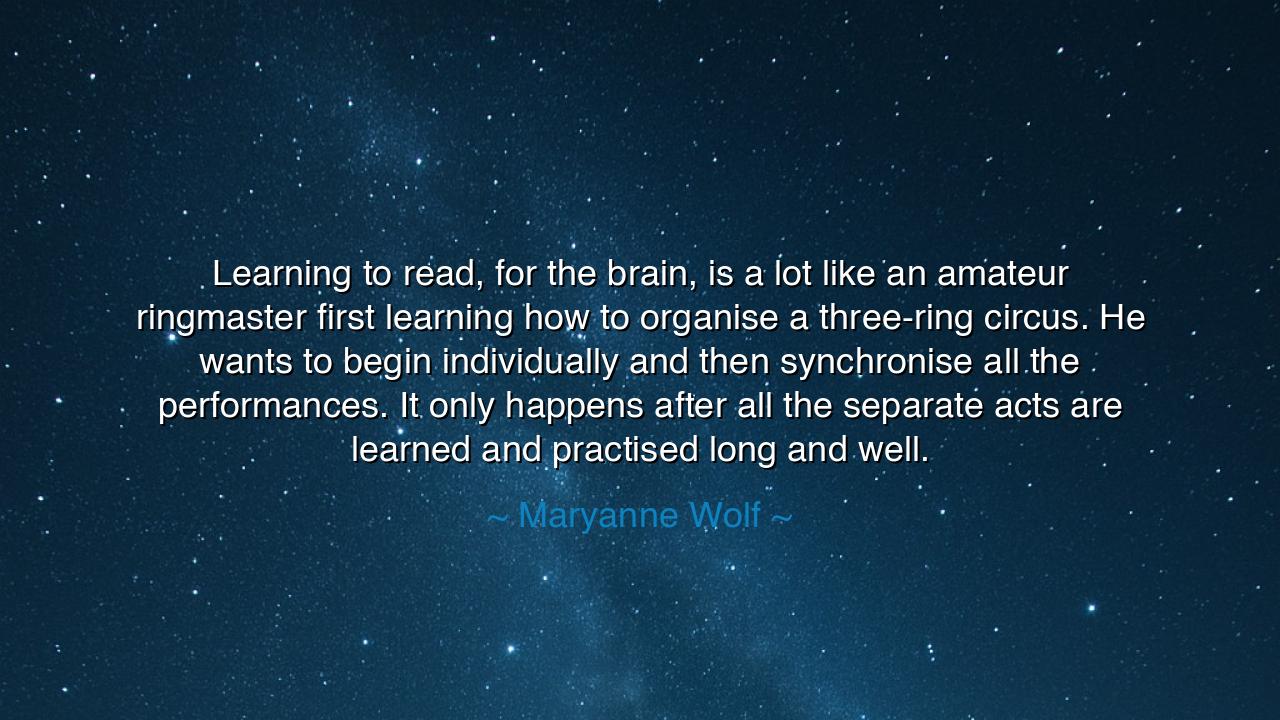
Learning to read, for the brain, is a lot like an amateur
Learning to read, for the brain, is a lot like an amateur ringmaster first learning how to organise a three-ring circus. He wants to begin individually and then synchronise all the performances. It only happens after all the separate acts are learned and practised long and well.






In the councils of old, teachers said the mind is a city at dawn—many streets, one sun. Maryanne Wolf’s image gives that sunrise a carnival: “Learning to read, for the brain, is a lot like an amateur ringmaster first learning how to organise a three-ring circus. He wants to begin individually and then synchronise all the performances. It only happens after all the separate acts are learned and practised long and well.” She speaks as a scholar of the reading circuit, reminding us that reading is not a single gift bestowed at birth but an orchestra we assemble: vision, sound, meaning—three rings that must be coaxed into one show.
First, the tents are pitched one by one. In one ring the eyes and occipital cortex learn the strokes of letters—curves, stems, wedges—until a b is no longer a stick and a belly but a friend who shows up on time. In the second ring the ear-mind marries symbols to sounds: phonemes clicking into syllables, syllables into words. In the third ring meaning enters with its wagons: vocabulary, world-knowledge, inference, emotion. The amateur ringmaster—the child’s brain—cannot command all three at once. He rehearses each troupe separately, drops cues, loses timing, tries again.
Only after the animals are tame and the acrobats sure-footed does the ringmaster call for the synchronise: eyes catching print while sounds whisper beneath, while meaning unfurls like banners around the ring. Fluency is not a sprint; it is choreography, built from thousands of humble drills. Wolf’s metaphor insists on patience. You do not scold an elephant for missing a step on day three; you lead it, feed it, repeat. So with learning to read: repetition is mercy, not monotony.
Consider a historical tale that proves the principle. Frederick Douglass, forbidden schooling, gathered his separate acts in secret: letters from shipyard markings, sounds from sympathetic boys on the street, meaning from tattered newspapers. He practiced long and well, and then the rings suddenly met. What followed was not merely literacy but liberty—the mind’s tent rising so high it changed the weather of a life. Douglass’s triumph shows that when the acts finally synchronise, the performance can move nations.
Teachers in every age see the same arc. A child lingers on phonemic drills—tapping out /c/ /a/ /t/—while another bathes in stories, building background knowledge like a reservoir. A third works the visual ring, copying letters until the shapes blur into reflex. Then, one autumn morning, the circus happens: the page no longer looks like a crowd but like a parade with music. The child laughs at a line of text; comprehension has joined fluency; the tents glow with one light.
Wolf’s image also guards us against two errors. The first is haste: demanding the full circus before the separate acts are ready—skipping explicit phonics or slighting knowledge-building—leaves the ringmaster frantic and ashamed. The second is fragmentation: rehearsing one tent forever and never calling the music. Wisdom keeps the sequence and the synthesis: learned and practised parts, then timed together; precision first, then speed; accuracy, then expression.
From this teaching, draw a clear lesson and a set of practices. Build daily rituals for each ring: brief, explicit sound–symbol work; wide, joyful reading for meaning and knowledge; quick visual review of patterns and spellings. Layer them: echo reading, choral reading, then solo—a conductor’s crescendo. Keep records like a circus ledger—what step wobbled, what cue landed—so instruction answers need, not habit. Above all, honor time: mastery is rehearsed, not wished. Do these things, and you will see what Wolf promises—the moment when the three-ring circus becomes a single wonder, when the brain does with ink what a heart does with music, and the tent of language fills with light.






AAdministratorAdministrator
Welcome, honored guests. Please leave a comment, we will respond soon